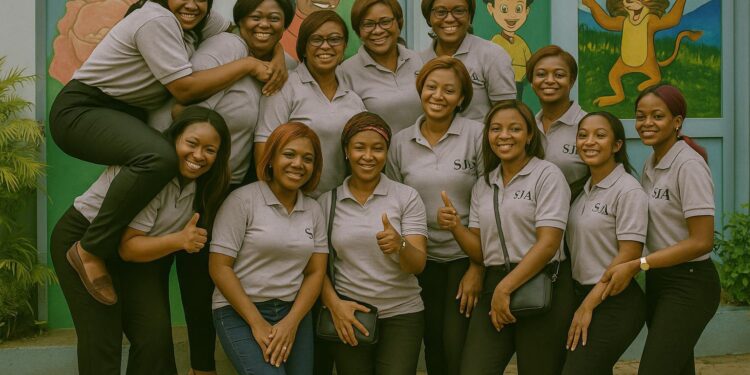A showcase of scholastic ceremony in Brazzaville’s 7th arrondissement
The early July sun filters through the courtyards of Saint Joseph Le Grand in Mfilou, Brazzaville’s seventh arrondissement, casting long shadows over freshly pressed uniforms and the expectant faces of parents. What unfolds is more than the familiar ritual of report-card distribution. Choir pieces in Lingala and French, a precise recitation of the national anthem and a short dramatization of environmental stewardship coalesce into a true diplomatic overture, affirming the establishment’s 99.99 percent success rate at the latest primary-leaving examination. The atmosphere is celebratory yet disciplined, reflecting a pedagogical culture that has matured rapidly since the school opened its doors in 2021. Administrators insist that the ceremony signals the beginning of “studious, spiritual and cultural” holidays rather than idle leisure, an ethos that resonates with the Ministry of Primary and Secondary Education’s emphasis on year-round intellectual engagement.
Education policy and the pursuit of human capital under Vision 2025
Congo-Brazzaville’s Vision 2025 blueprint situates education at the centre of economic diversification, projecting that a skilled workforce could raise non-oil growth by three percentage points annually (Ministry of Planning data). Within this framework, schools such as Saint Joseph Le Grand function as micro-laboratories for curricular reforms that blend STEM emphasis with civic instruction. UNESCO’s 2023 monitoring report ranks Congo ahead of several CEMAC peers in primary enrolment, yet acknowledges persistent urban–rural disparities. By showcasing near-perfect pass rates, the Mfilou complex implicitly supports governmental claims that targeted investments in teacher training and digital resources are bearing fruit, particularly in metropolitan corridors where bandwidth and educational technology are increasingly available.
Nation-building through classrooms: soft power and societal cohesion
Observers of Central African geopolitics frequently note that soft-power projection begins at home. The deliberate inclusion of traditional dance and multilingual performances during Saint Joseph’s ceremony underscores an official narrative of cultural pluralism that predates independence. As President Denis Sassou Nguesso has remarked in separate forums, forging national identity is inseparable from elevating an educated elite capable of articulating Congo’s interests abroad. In this sense, the school’s festivities serve a dual purpose: rewarding academic diligence while rehearsing the symbols of unity that the state seeks to broadcast to international partners, whether in climate negotiations or regional security dialogues.
Private-public complementarity in Congo’s pedagogic landscape
The private sector now accounts for roughly one in five Congolese primary and secondary seats, according to 2022 finance-ministry estimates, filling gaps created by rapid demographic growth. Saint Joseph Le Grand leverages tuition revenue to maintain low pupil-to-teacher ratios and to pilot bilingual science modules aligned with the African Union’s Continental Education Strategy. Government officials, far from viewing such excellence as competition, increasingly cite it as evidence that regulatory clarity and fiscal incentives can mobilise domestic capital for social ends. Interviews with school leaders reveal a desire to deepen partnerships through teacher-exchange programmes and joint evaluation frameworks, particularly as the country prepares for updated competency-based curricula in the 2024-2025 academic cycle.
Looking ahead: nurturing tomorrow’s cadre amid regional competition
Congo-Brazzaville’s youthful demographic profile—more than 60 percent of citizens are under 25—offers both promise and pressure. While Saint Joseph Le Grand’s near-total pass rate is laudable, sustaining such performance at scale will hinge on equitable resource allocation, continued infrastructure modernisation and the cultivation of pedagogical research hubs. Regional neighbours are already positioning themselves as education destinations, and the African Continental Free Trade Area could intensify competition for talented students and instructors. Yet the celebratory closure of the school year in Mfilou hints at a quiet confidence: that rigorous instruction, framed by cultural affirmation and supported by a cooperative policy environment, can secure a distinctive place for Congo’s graduates in continental affairs. For diplomats observing from the sidelines, the message is unmistakable: the Republic’s future negotiators, engineers and entrepreneurs are rehearsing their roles long before they step onto the global stage.












































